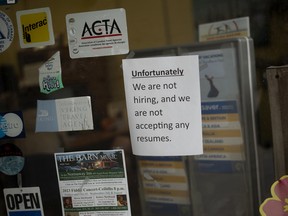
Joblessness Approaching Worrying Levels, Economist Warns
In a recent interview, Brendon Bernard, senior economist at Indeed.com, expressed concerns about the rising levels of joblessness in various regions. He spoke with Financial Post’s Larysa Harapyn, discussing several factors contributing to this shift, including the widening gap between jobs and population growth.
The Shift from Strong Job Market to Weak
According to Bernard, "it’s a really striking shift from what was a strong job market to now one where, especially for youth, is a pretty weak job market." This statement highlights the stark contrast between the past and present employment trends. The economist attributes this change to several underlying factors that are working against the favor of employment rates.
The Widening Gap Between Jobs and Population Growth
One key factor contributing to the rise in joblessness is the widening gap between jobs and population growth. As the population increases, the demand for jobs also rises, but if the number of available positions does not keep pace with this growth, unemployment rates will inevitably increase.
Bernard emphasizes that this issue is particularly pressing among young people. "For youth, it’s a pretty weak job market," he notes. This suggests that younger generations are disproportionately affected by the rising levels of joblessness.
Additional Factors Contributing to Joblessness
Beyond the widening gap between jobs and population growth, there are several other factors contributing to the rise in joblessness. Bernard highlights some of these key issues:
- Skills mismatch: The rapidly changing nature of the workforce means that many workers lack the necessary skills to adapt to new technologies and industries.
- Geographic disparities: Joblessness varies significantly across different regions, with some areas experiencing much higher levels of unemployment than others.
- Industry shifts: Changes in industry dynamics can lead to job losses, as companies shift towards more automated processes or outsource jobs to other countries.
The Impact on the Economy
The rising levels of joblessness have significant implications for the economy. When a large proportion of the population is unemployed, it can lead to reduced consumer spending, decreased economic growth, and increased poverty rates. As Bernard notes, "joblessness approaching ‘worrying levels’ is a cause for concern, as it can have far-reaching consequences for individuals, communities, and the broader economy."
Conclusion
In conclusion, the rising levels of joblessness are a pressing issue that requires attention from policymakers, employers, and workers alike. By understanding the underlying factors contributing to this shift, we can begin to develop strategies to mitigate its effects and promote more inclusive and sustainable employment trends.
Recommendations for Policymakers
- Invest in education and training programs: To address the skills mismatch issue, policymakers should invest in education and training initiatives that equip workers with the necessary skills to adapt to new technologies and industries.
- Implement targeted job creation strategies: By focusing on specific regions or industries, governments can create jobs and stimulate local economies.
- Foster industry partnerships: Encouraging collaboration between employers and educational institutions can help address the skills mismatch issue and promote more effective workforce development.
The Way Forward
While the rising levels of joblessness are a cause for concern, they also present an opportunity for growth and innovation. By working together to develop more inclusive and sustainable employment trends, we can build a stronger, more resilient economy that benefits all members of society.
Additional Resources
- For further information on joblessness and its impact on the economy, consult the following resources:
Stay Informed
To stay up-to-date on the latest news and analysis on joblessness, employment trends, and economic policy, follow us on social media or sign up for our newsletter.
We appreciate your feedback and would like to hear from you. Please share your thoughts and insights in the comments below.
You must be logged in to join the discussion or read more comments. Create an Account Sign in Join the Conversation Postmedia is committed to maintaining a lively but civil forum for discussion. Please keep comments relevant and respectful. Comments may take up to an hour to appear on the site. You will receive an email if there is a reply to your comment, an update to a thread you follow or if a user you follow comments. Visit our Community Guidelines for more information.


